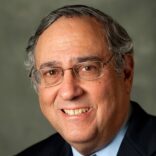Over a half-century ago, Dr. Emmanuel Rackman, then considered the “dean” of Modern Orthodox rabbis, delineated two groups causing “ferment in Orthodoxy.” One group desired higher walls to separate Orthodoxy from the surrounding culture. The second advocated greater immersion in the modern culture, including addressing the challenges of secular scholarship and enhanced theological exchange across denominational lines. Rabbi Rackman credited both groups as strengthening American Judaism, but concluded that to be included within the latter group constituted “a spiritual delight.”
In retrospect, the aspiration of charedi leaders to rebuild the world lost in the Holocaust and revive Torah scholarship largely has been realized. Once considered moribund, charedi Orthodoxy is here to stay, and given high birthrates, already comprises two-thirds of the Orthodox community. By contrast, Modern Orthodoxy over the past decades has often appeared in retreat from its bold vision, defined by the pluralism, intellectual openness, and commitment to social justice so nobly championed by Rabbi Rackman five decades ago.
For example, when the Synagogue Council of America, the body charged with interdenominational dialogue among religious leaders, collapsed in 1994 of its own accord, the then-professional head of the Orthodox Union saw fit to recite publicly the “shehehechyanu” prayer blessing its demise. Similarly, at Modern Orthodoxy’s flagship institution, Yeshiva University, a senior Talmud instructor identified Modern Orthodoxy as “the Amalek of our time,” a reference to the Torah’s personification of evil. Relatively marginal points of Jewish law, such as the prohibition on males from listening to female singing voices, rose to existential significance within many Modern Orthodox settings. And many Orthodox leaders dropped the nomenclature of “Modern Orthodoxy” for the more value-neutral “Centrist Orthodoxy,” preferring vagueness to boldness of ideology.
But, as the laws of physics dictate, the pendulum does swing back. At century’s close, a group of Modern Orthodox leaders coalesced to establish Yeshivat Chovevei Torah (YCT) as an alternate rabbinical seminary designed to be inclusive of all Jews, open to a range of diverse perspectives, and serve as a corrective to Modern Orthodoxy’s rightward drift. Although indebted to the scholarship of the classical yeshivot of Eastern Europe, the YCT curriculum owed much as well to the Western European rabbinical seminary models, including critical scholarship, cooperation with the liberal movements and passionate embrace of Zionism and Jewish peoplehood.
To be sure, notwithstanding my identification with YCT’s principles, initially, I, like many others, was skeptical as to its future. To my mind, Yeshiva University remained the most important Orthodox institution in the U.S. I could not see how a start-up rabbinical school could possibly compete for students and faculty. To the contrary, I believed that YCT’s leaders would be better advised to remain within the YU fold and advocate for alternative directions within it.
Thankfully, the past two decades have proven me wrong. YCT has created an inspiring model of rabbinical training. Its graduates have embraced the values of pluralism, gender equality to the extent compatible with Jewish law, academic scholarship as necessary for 21st-century rabbis and Israel as a laboratory for the application of Judaic principles to the real-life challenges of a modern liberal democracy. Its 120 alumni now serve in synagogues, schools and university Hillels around the country.
Moreover, YCT incorporates several unique dimensions of rabbinical training. Beyond academic study, each student pursues a program of professional development customized to his personal needs and aspirations. All students pursue two-year internships at a synagogue, school, or university campus and, in turn, take yearlong seminars on working within these respective settings taught by senior mentors in the field. Pastoral counseling faculty meet multiple times yearly with each student on their aspirations for the rabbinate, enabling them to know themselves better and thereby enhance their prospective rabbinates. This individualized model of training is virtually unique among rabbinical seminaries. As a result, communal leaders report that YCT alumni are respected for their success in building institutions that are open, inclusive and engaging.
Above all, YCT signals a refreshing change in atmospherics. Through the model of open-ended inquiry in research and teaching, YCT encourages questioning, debate and open quest for answers to the major theological and halachic questions of the day, ranging from conversion to Judaism to equitable labor practices.
To be sure, YCT remains very much a work in progress, one that has experienced considerable growing pains, but whose most exciting chapters yet lie ahead. The stakes in its success are high for Modern Orthodoxy and for the community generally. Orthodoxy is growing numerically, and its voices need to be heard. What is in question is whether those voices will be heard in a spirit of communal cooperation and principled pluralism, or whether its voices will fail to gain a hearing due to increased polarization.
Steven Bayme is national director of Contemporary Jewish Life at the American Jewish Committee, and as visiting faculty, Yeshivat Chovevei Torah.
The New York Jewish Week brings you the stories behind the headlines, keeping you connected to Jewish life in New York. Help sustain the reporting you trust by donating today.





